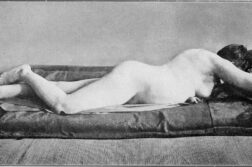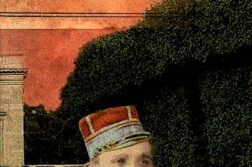ONE SPRING DAY in 1922, Virginia Woolf saw her friend E. M. Forster, then 43, on a London street, and later wrote in her diary: “The middle age of buggers is not to be contemplated without horror.” What would she think of Wendy Moffat’s much-praised biography of Forster, A Great Unrecorded History (2010), with its focus on her friend’s sexuality? Unlike P. N. Furbank’s official study, simply titled E. M. Forster: A Life (1978), which discusses Forster’s homosexuality as only one facet of his works and days, or Nicola Beauman’s E. M. Forster: A Biography (1994), which expands somewhat on Furbank’s account of Forster’s sex life, Moffat treats his search for homosexual expression and identity as the essential explanation for his creativity.
Moffat offers a wealth of detail about Forster’s sexuality—history and preferences, foibles and successes. Yet we never learn his favorite season or color, his preferred breakfast, what he cooked for dinner (“simply,” we’re told), if he wore a scent, or which composers he loved. With sexuality in the foreground of her research, Moffat relies on previously unpublished diaries and letters. After his mother’s death in 1945, Forster destroyed most of his family’s papers (later regretting it) but he preserved the records he’d kept of his sexual affairs—with an eye to their future value—so it’s fair for Moffat to go digging through his past. What’s fair, however, can lead to a kind of distortion. Halfway through the book, I wondered if Moffat would like her own sexual history to receive the meticulous attention she has given to Forster’s.
I don’t think I’m being prudish, and my remark about Moffat’s own sex life is not meant to be flippant. It’s rare for people to share the complete details of their sex life as lived over a lifetime, and the focus of A Great Unrecorded History raises questions about what is worth recording, what we mean by a “private life,” and even why Moffat adds the word Great to her title. We learn from one of Forster’s young conquests (I hesitate to write the word lover, which Moffat over-uses) that he often had holes in his socks. We read of his frequent masturbation in childhood and in old age. We follow as he picks up a ship’s stoker, a French sailor, a cabdriver, a policeman. And we hear from the writer himself that his penis had a great deal of foreskin. Do these facts humanize Forster? explain his art? Socks wear out, children and adults masturbate, penises have their distinctive characteristics. Such details come with a steady drone, punctuated by assurances that Forster was a great writer, a great friend, a great man, a great human being. In short, Moffat is an apologist mounting a defense.
The portrait of Forster’s sexuality offered by Moffat makes me think of a canvas by Francis Bacon covered over with Norman Rockwell images. Forster’s sad sexual conquests while travelling in India and Egypt read like adventures in sexual tourism, his persistent pursuit of much younger working-class men, who were often married (or soon to be), seems downright self-defeating, and the way he used his fame, money, and class position to charm and, later, manipulate his partners, almost makes mincemeat out of his talk of friendship, ethics, and the examined life. That some of these young men responded and even involved Forster in their marriages as a friend of the family (Forster bought one couple, the Buckinghams, a house nearby, which gave him easy access to the husband) is harder to explain than Forster’s motives, which are in fact quite transparent.
Forster’s claim that “I want to love a strong young man of the lower classes and be loved by him and even hurt by him” has an Edwardian ring that also brings to mind Lady Chatterley and her gardener—a fantasy still alive in our culture. Moffat may prefer to focus on the word “love” in this passage, but the word that stays in my mind after completing her book is “lower.” Forster never seemed to forget who he was, even while making love. At the age of 52, he met Bob Buckingham, a policeman who was 25 years his junior. The two men remained involved until Forster’s death at age ninety, though afterward Bob denied their sexual relationship (but his wife admitted to it). Forster wanted commitment from his partners, yet he always chose people who were essentially unavailable. He felt frustrated that he couldn’t share the life of the mind with Bob—he felt this about all of his lovers—and was annoyed when Bob’s passion cooled after he bought him a house.
Forster knew he was living a double life and spoke of his divided self or conflicted identity, which makes his counsel “only connect” sound disingenuous. This double life was accompanied by lying, distortion, betrayal, and even blackmail. We should remember, however, that he lived during a dangerous time of official homophobia almost unimaginable today. Forster came to his maturity under the shadow of Oscar Wilde’s imprisonment, and saw the persecution of gay men continue throughout the course of his adult life. Five years before his death in 1970, he wrote: “When I am 85 how annoyed I am with Society for wasting my time by making homosexuality criminal. The subterfuges, the self-consciousness that might have been avoided.” This seems as honest a declaration as Forster ever made about his life, yet the word “annoyed”—italics his—somehow trivializes his declaration. Too often he sounds like a spoiled only child (which in fact he was) who wants his way and nothing else. This is, of course, a common emotion that most people learn to hide or disguise, but I want something more, or better, from the great novelist.
His conflicted yearnings echo through the decades. My own life has spanned the Stonewall challenge through the plague years to a time of gay soldiers and gay marriage, where claiming civil rights for same-sex relations has turned some committed couples into the ordinary folks next door. Forster died a year after Stonewall and could never have envisioned a such a future of homogenized acceptance. Maurice and his working-class lover Scudder may have ended their novel in each other’s arms, but that’s the ending of a fairy tale.
Forster may have put such on emphasis love and loving because he needed to see a constant reflection of himself in another person; he felt incomplete. In his private papers he was frank about his sexuality, but he had no use for Freud or for the kinds of self-reflections that psychoanalysis called for. He wanted to find a place for living his sexuality rather than for understanding it. This is admirable at a time of oppression, as it affirms the importance of each individual life, but it doesn’t help us understand the significance that sexual expression can have over an individual’s lifetime. As he aged, Forster came to praise “Half-understanding the truest wisdom, at least in private matters.” There may have been much about his life that he preferred to overlook. At age seventy he wrote: “For I cannot speak to others of my worst trouble, which is that I have got tired of people and personal relationships.” Ah, love does not conquer all.
How are gay men and women better off today than in Forster’s time? A young undergraduate like Forster would be able to enroll in gay literature or gender studies courses at many large universities. As it happens, I’ve noticed that these courses often have larger enrollments of straight women. A few middle-aged gay couples now have their wedding announcement in the Style section of the Sunday New York Times, but gay bookstores are closing for want of readers. Despite the increased normalization of homosexuality, the growing threat from orthodox religions—and not only in our own back yard—gives me pause. At the university where I teach, which has a large multicultural student body, I’m frequently taken aback by the intense homophobia of students from traditional backgrounds. I discern echoes of Forster in the “Terminal Note” he wrote for Maurice in the late 1950’s, describing the shift in public attitudes toward homosexuality during his lifetime: “the change from ignorance and terror to familiarity and contempt.” Perhaps we still have more in common with the nervous young E. M. Forster than we like to admit.





